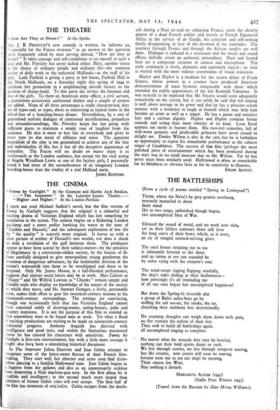iiovv Are They at Home?" At the Apollo.
THE THEATRE
MR. J. B. PRIESTLEY'S new comedy is written, he informs us, especially for the Forces overseas " as an answer to the question most frequently asked by men serving abroad, " How are they at home? " It takes courage and self-confidence to set oneself to such a task and Mr. Priestley has never lacked either. Here, another virtue is his choice of ordinary people and ordinary life—the common reality of daily work in the industrial Midlands—as the stuff of his play. Lady Farfield is giving a party at her house, Farfield Hall in the North Midlands, on a Saturday night this spring of 5944 to celebrate her promotion in a neighbouring aircraft factory to the position of charge-hand. To this party she invites the foreman and two of the girls. To them an American army officer, a civil servant, a pretentious aristocratic uniformed shirker and a couple of airmen are added. None of all these personages is really characterised, they are all types and, as types, about as interesting as typical items in the bill-of-fare of a boarding-house dinner. Nevertheless, by a sort of generalised realistic dialogue of contrasted mystifications, prejudices and misunderstandings, Mr. Priestley keeps the fun going with sufficient gusto to maintain a steady roar of laughter from the audience. He also is more or less fair to everybody and gives to every type its due meed of silliness and sense. The apparent naturalism of the play is too generalised to achieve any of the bite and individuality of life, but it has all the deceptive appearance of normality. The Forces will no doubt en masse enjoy it as vociferously as the London audience, but except for the vital acting of Angela Wyndham Lewis as one of the factory girls, I personally found it had more of the savourlessness of an imaginary London boarding-home than the vitality of a real Midland party.
JAMES REDFERN.


























 Previous page
Previous page